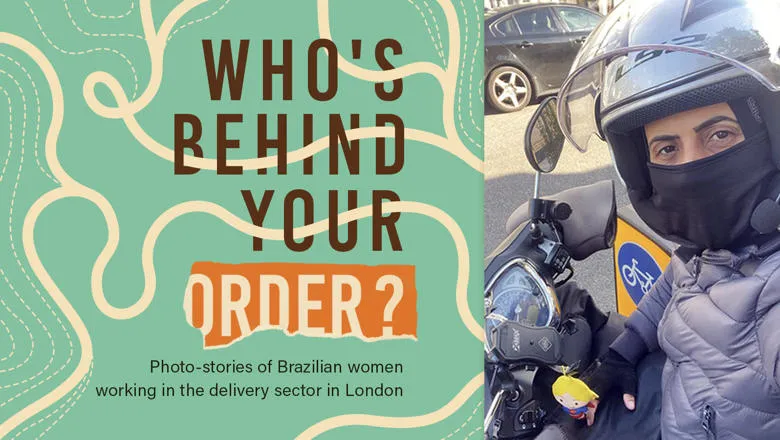
Latin American migrant women working as delivery drivers across London have documented the harassment and unsafe working conditions they face every day, for a new photographic exhibition; Who’s behind your order?
The exhibition, which is part of a wider research project led by Professor Cathy McIlwaine in the Department of Geography, features the experiences of five Brazilian women who documented their daily lives by taking photos on their mobile phone cameras.
The women also shared narratives with the researchers over WhatsApp and Zoom, responding to questions about their thoughts on life in London. Some told stories of violence, theft and humiliation.
Once I made a delivery at night and arriving at the customer’s house he saw me through the window, waved and I walked towards the door. When he opened the door, he was completely naked. At the time I didn’t react, I was very afraid because I felt powerless. At the time I didn’t have a visa so I felt my hands were tied.
Brazilian migrant delivery driver and Photographer
One woman describes how a lack of publicly available bathrooms for females can prove difficult, particularly during her menstrual period, while another woman said she feels scared every time she has to deliver down a dark street.
Alongside the difficult times, the women also emphasise how working as a delivery driver in London gives them financial independence and stability to support themselves and their families.
While the labour market is a major site of gender-based abuses, financial autonomy is really important for the women in terms of their independence and allowing them to leave perpetrators of direct forms of gender violence.
Professor Cathy McIlwaine, Principal Investigator and Professor of Geography
Professor McIlwaine’s research, which examines the transnational and localised dynamics of gender-based violence experienced by Brazilian women in Rio de Janeiro and in London, revealed that 82% of Brazilian women had experienced gender-based violence and 78% of it was perpetrated in the public sphere, particularly at the workplace.
The findings of the research, funded by UKRI, are published in the report We Can’t Fight in the Dark.
Who’s behind your order? aims to raise awareness about the lives of migrant Brazilian women and reclaim their rights in London. The exhibition has been developed in collaboration with community organisation, Migrants in Action (MinA).
Carolina Cal, Founder and Artistic Director of MinA, said: “Migrants in Action believes in the arts as a safe and positive space where migrant women can freely express themselves, celebrate achievements, reflect on their daily struggles, as well as influence social change. We want to show the reality and feelings of what it is like to be a woman working as a courier in a foreign country and expect that it will reflect in some changes in the app-based delivery sector in the UK.”
Other partners include Arts Council England and the People’s Palace Project at Queen Mary University London.
The free exhibition is now open at Brixton House until Saturday 24 June.
